|
Books Should Be Free Loyal Books Free Public Domain Audiobooks & eBook Downloads |
|
|
Books Should Be Free Loyal Books Free Public Domain Audiobooks & eBook Downloads |
|
Fiction |
|---|
|
Book type:
Sort by:
View by:
|
By: Frederick Marryat (1792-1848) | |
|---|---|
 The Three Cutters
The Three Cutters
| |
 Newton Forster The Merchant Service
Newton Forster The Merchant Service
| |
 The Settlers in Canada
The Settlers in Canada
| |
 Peter Simple; and, The Three Cutters, Vol. 1-2
Peter Simple; and, The Three Cutters, Vol. 1-2
| |
 The Mission
The Mission
| |
 Japhet, in Search of a Father
Japhet, in Search of a Father
| |
 Japhet in Search of a Father
Japhet in Search of a Father
| |
 The Little Savage
The Little Savage
| |
 The Poacher Joseph Rushbrook
The Poacher Joseph Rushbrook
| |
 The Privateer's-Man One hundred Years Ago
The Privateer's-Man One hundred Years Ago
| |
 Naval Officer, or Scenes in the Life and Adventures of Frank Mildmay
Naval Officer, or Scenes in the Life and Adventures of Frank Mildmay
Marryat was a midshipman under Captain Cochrane and this, his first naval adventure, is considered to be a highly autobiographical telling of his adventures with one of Britain's most famous and daring naval captains. | |
 The Little Savage
The Little Savage
| |
 Newton Forster
Newton Forster
| |
 Snarleyyow or The Dog Fiend
Snarleyyow or The Dog Fiend
| |
By: Frederick O. Bartlett (1876-1945) | |
|---|---|
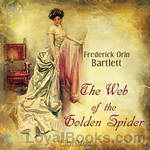 The Web of the Golden Spider
The Web of the Golden Spider
The Web of the Golden Spider is a tale of mystery, intrigue and adventure that begins in the city, progresses to a mutinous open sea voyage, eventually leading to the remotest areas on the slopes of the Andes of South America. Wilson, our hero, finds himself in the midst of a battle between a deposed queen and revolutionists who have banded together in an effort to bring their country together as a republic. Wilson, although torn between helping mercenaries, freedom fighters and revolutionaries, is more concerned with the rescuing of the girl he has fallen in love with, but who has been snatched from him by a mysterious priest... | |
By: Frederick Orin Bartlett (1876-1945) | |
|---|---|
 The Seventh Noon
The Seventh Noon
| |
 The Triflers
The Triflers
| |
By: Frederick S. Brereton (1872-) | |
|---|---|
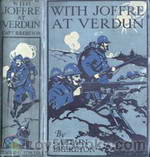 With Joffre at Verdun A Story of the Western Front
With Joffre at Verdun A Story of the Western Front
| |
By: Frederick Swainson | |
|---|---|
 Acton's Feud A Public School Story
Acton's Feud A Public School Story
| |
By: Frederick Vining Fisher (1866-) | |
|---|---|
 The Transformation of Job A Tale of the High Sierras
The Transformation of Job A Tale of the High Sierras
| |
By: Frederik Pohl | |
|---|---|
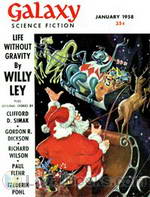 The Knights of Arthur
The Knights of Arthur
Sailors Sam Dunlap and Arthur check in to a New York hotel to await their mate Vern Engdahl when a girl shows up proposing to purchase Arthur. They need guys like Arthur to help run the city, and the fact that he fits in a small suitcase is even better. – The Knights of Arthur was first published in the January 1958 edition of Galaxy Science Fiction magazine. | |
By: Fredric Brown (1906-1972) | |
|---|---|
 Earthmen Bearing Gifts
Earthmen Bearing Gifts
| |
 Keep Out
Keep Out
| |
By: Fredrika Bremer (1801-1865) | |
|---|---|
 The Home Or, Life in Sweden
The Home Or, Life in Sweden
| |
 Strife and Peace
Strife and Peace
| |
By: Friedrich de La Motte-Fouqué (1777-1843) | |
|---|---|
 Undine
Undine
Undine is a novel by Friedrich de la Motte Fouqué concerning Undine, a water spirit who marries a Knight named Huldebrand in order to gain a soul. It is an early German romance, which has been translated into English and other languages. The novel served as inspiration for two operas in the romantic style by Ernst Theodor Amadeus Hoffmann and Albert Lortzing, respectively, and two ballets: the nineteenth century Ondine and the twentieth century Undine. An edition of the book was illustrated by Arthur Rackham... | |
By: Friedrich Heinrich Karl Freiherr de La Motte-Fouqué (1777-1843) | |
|---|---|
 Aslauga's Knight
Aslauga's Knight
| |
 The Two Captains
The Two Captains
| |
By: Friedrich Kerst | |
|---|---|
 Mozart, The Man and the Artist as Revealed in His Own Words
Mozart, The Man and the Artist as Revealed in His Own Words
Wolfgang Amadeus Mozart. His name is one of the most recognizable names in history and one of the most enduring of composers. At age 5, this “wunderkinder” took to the stage and began his life as a prolific and celebrated creator-genius of such luminous works the world has not known since. This collection of morsels taken from his personal letters is engaging and gives a look into the mind of the boy wonder. Was he mad? Was he miraculous? | |
By: Friedrich Maximilian Klinger (1752-1831) | |
|---|---|
 Faustus his Life, Death, and Doom
Faustus his Life, Death, and Doom
| |
By: Friedrich Schiller (1759-1805) | |
|---|---|
 The Ghost-Seer; or the Apparitionist; and Sport of Destiny
The Ghost-Seer; or the Apparitionist; and Sport of Destiny
| |
By: Fritz Leiber (1910-1992) | |
|---|---|
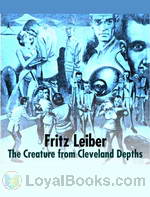 The Creature from Cleveland Depths
The Creature from Cleveland Depths
“The Creature from Cleveland Depths” also known as “The Lone Wolf” tells the story of a writer and his wife who refuse to move below-ground after the cold-war gets hot. The underground society discovers a decline in their ability to creatively innovate, and must consult with surface dwellers to develop products that satiate the needs of a people living like moles. But the latest product to result from this alliance, “The Tickler” has frightening implications that only our heroes seem to notice. – This story appeared in the December, 1962 issue of “Galaxy” magazine. | |
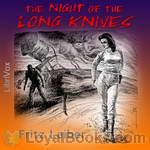 The Night of the Long Knives
The Night of the Long Knives
"I was one hundred miles from Nowhere—and I mean that literally—when I spotted this girl out of the corner of my eye. I'd been keeping an extra lookout because I still expected the other undead bugger left over from the murder party at Nowhere to be stalking me." In a Post apocalyptic world, the few people left must be strong. And must not hesitate to kill. Of course, killing another Deathlander was one of the chief pleasures and urges of all the solitary wanders in this vast wasteland. Kill and kill again. But this other was a girl and that brought up the second great urge: sex. Which was it to be today? Perhaps both? | |
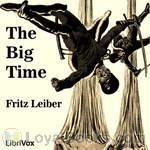 The Big Time
The Big Time
A classic locked room mystery, in a not-so-classic setting. (Intro by Karen Savage) | |
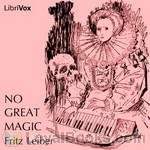 No Great Magic
No Great Magic
They were a traveling group of Shakespearean players; perfectly harmless, right? Wrong. For one thing, why did they have spacemen costumes in their wardrobes, right next to caveman ones? Why was the girl in charge of backstage suffering from amnesia and agoraphobia? No Great Magic is needed to perform the plays they put on, but sometimes great science. No matter where, or when. | |
By: Furnley Maurice (1881-1942) | |
|---|---|
 The Bay and Padie Book Kiddie Songs
The Bay and Padie Book Kiddie Songs
| |
By: Fyodor Dostoyevsky (1821-1881) | |
|---|---|
 Crime and Punishment
Crime and Punishment
A mysterious crime is being plotted in a tiny garret above a dilapidated apartment building in St Petersburg in Russia. The plotter, Rodion Raskolinikov, is a poor student who has delusions of ridding the world of “worthless vermin” and counter balancing these crimes with good deeds. He commits a murder to test his own theories and prove that crime comes naturally to the human species. Crime and Punishment is a path-breaking novel of ideas that changed the course of novel writing in the 20th century... | |
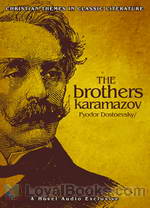 The Brothers Karamazov
The Brothers Karamazov
Set in 19th century Russia, The Brothers Karamazov (Russian: Братья Карамазовы) is the last novel written by the illustrious author Fyodor Dostoyevsky who died a few months before the book's publication. The deeply philosophical and passionate novel tells the story of Fyodor Karamazov, an immoral debauch whose sole aim in life is the acquisition of wealth. Twice married, he has three sons whose welfare and upbringing, he cares nothing about. At the beginning of the story, Dimitri Karamazov, the eldest son who is now a twenty-eight year old war veteran, returns to his home town to claim the inheritance left to him by his dead mother... | |
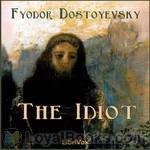 The Idiot
The Idiot
The extraordinary child-adult Prince Myshkin, confined for several years in a Swiss sanatorium suffering from severe epilepsy, returns to Russia to claim his inheritance and to find a place in healthy human society.The teeming St Petersburg community he enters is far from receptive to an innocent like himself, despite some early successes and relentless pursuit by grotesque fortune-hunters. His naive gaucheries give rise to extreme reactions among his new acquaintance, ranging from anguished protectiveness to mockery and contempt... | |
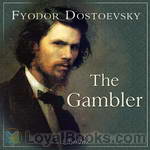 The Gambler
The Gambler
The Gambler is a short novel by Fyodor Dostoevsky about a young tutor in the employment of a formerly wealthy Russian general. The novella reflects Dostoevsky's own addiction to roulette, which was in more ways than one the inspiration for the book: Dostoevsky completed the novella under a strict deadline so he could pay off gambling debts. | |
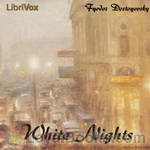 White Nights & Other Stories
White Nights & Other Stories
White Nights and Other Stories by Fyodor Dostoyevsky is a compilation published in 1918 by The MacMillan Company, NY (USA) and Heinemann (UK). It contains these 7 works:- White Nights- Notes from the Underground- A Faint Heart- A Christmas Tree and a Wedding- Polzunkov- A Little Hero- Mr. Prohartchin | |
 Possessed
Possessed
| |
 Crocodile
Crocodile
Ivan Matveich, the most ordinary person you might hope to meet, is swallowed alive by a crocodile at a sideshow. Finding life inside the belly of the beast quite comfortable, he makes a home for himself there. His disquisitions on the state of the world from inside the crocodile make him quite a name for himself; while all the while the discussion rages outside as to whether the beast is going to be cut open to release him or not, its value as a sideshow attraction having massively increased owing to the presence of the human voice buried inside it. One of Jorge Luis Borges' seven most favourite stories. - Summary by Tony Addison | |
 Permanent Husband
Permanent Husband
THE PERMANENT HUSBAND, also published as The Eternal Husband, is a psychological novella by the acclaimed Russian author Fyodor Dostoyevsky. The plot revolves around the intense and complex relationship between Velchaninov and Trusotsky. Velchaninov, the protagonist, is a former lover of the recently deceased wife of Trusotsky, the title character. Some critics have ranked this novella among Dostoeyevsky’s best works because of its style and structure. Alfred Bem has called it "one of the most complete works by Dostoyevsky in regards to its composition and development. – Adapted from Wikipedia An excellent commentary may be found here. | |
By: G. Boare | |
|---|---|
 What became of Them? and, The Conceited Little Pig
What became of Them? and, The Conceited Little Pig
| |
By: G. C. Huddleston | |
|---|---|
 Bluebell A Novel
Bluebell A Novel
| |
By: G. E. Wyatt | |
|---|---|
 Archie's Mistake
Archie's Mistake
| |
By: G. Firth Scott | |
|---|---|
 Colonial Born A tale of the Queensland bush
Colonial Born A tale of the Queensland bush
| |
By: G. J. (George John) Whyte-Melville (1821-1878) | |
|---|---|
 Kate Coventry An Autobiography
Kate Coventry An Autobiography
| |
By: G. K. Chesterton (1874-1936) | |
|---|---|
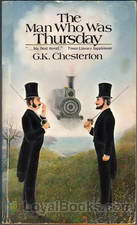 The Man Who was Thursday
The Man Who was Thursday
Two poets in a London park at sunset, debating on the attributes of poetry and whether it's really a metaphor for anarchy. A group that meets in secret, planning to overthrow the world order. Disguises and deceptions, ideals and ideology. A medley of themes and genres makes this a great read for anyone who's a fan of Chesterton and his iconic Father Brown. The Man Who Was Thursday includes Chesterton's favorite theme of Christianity with touches of delightful humor to enliven the twists and turns that abound throughout the book... | |
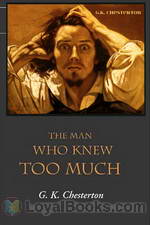 The Man Who Knew Too Much
The Man Who Knew Too Much
Robbery, murder and treason. Strange happenings in quiet English villages. A book critic who happens to find a corpse with its head crushed, an Irish freedom fighter framed for a crime, the disappearance of a valuable coin, a strange dispute over a property claim and a host of other intriguing situations make up the contents of G K Chesterton's collection of short stories The Man Who Knew Too Much. For fans of Chesterton's immortal clerical sleuth, Father Brown, these stories are equally delightful and intricately wrought... | |
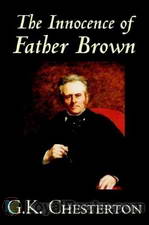 The Innocence of Father Brown
The Innocence of Father Brown
A Chief of Police hosts a dinner party for an American millionaire wishing to will his entire fortune to the Church of France. Jewels that have been stolen and recovered so many times that they're known colloquially by thieves as The Flying Stars. A murder committed by an invisible man. These and many others are the mysteries that are presented to the lovable, bumbling, stumpy Man of God, Father Brown. The Innocence of Father Brown, by G.K. Chesterton is a collection of eleven stories which marks the debut of this most unusual detective... | |
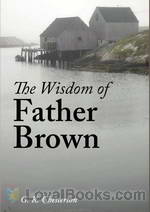 The Wisdom of Father Brown
The Wisdom of Father Brown
The Wisdom of Father Brown explores many characters and fascinating themes such as the following. An eminent criminologist is persuaded by the mild yet persistent Father Brown to sort out a family matter. Also, a Tuscan poet fancies himself as the King of Thieves. A famous French philosopher and atheist holds the key to a new invention called “Noiseless Powder.” A corpse is discovered in a dark passage backstage at London's Adelphi Theater. Finally there is Psychometric testing of criminals in Chicago... | |
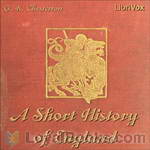 A Short History of England
A Short History of England
Gilbert Keith Chesterton was a prolific writer on many topics. His views of history were always from the standpoint of men and their interactions, and it may fairly be said he saw all of history as a battle between civilization and barbarism. So it has always been, and that remains true even today.“But it is especially in the matter of the Middle Ages that the popular histories trample upon the popular traditions. In this respect there is an almost comic contrast between the general information... | |
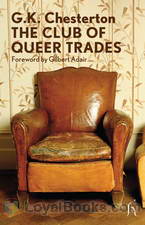 The Club of Queer Trades
The Club of Queer Trades
A collection of six wonderfully quirky detective stories, featuring the ‘mystic’ former judge Basil Grant. Each story reveals a practitioner of an entirely new profession, and member of the Club of Queer Trades. | |
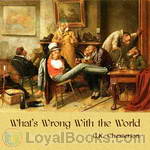 What's Wrong With the World
What's Wrong With the World
Gilbert Keith Chesterton (1874–1936) has been called the “prince of paradox.” Time magazine observed of his writing style: “Whenever possible Chesterton made his points with popular sayings, proverbs, allegories—first carefully turning them inside out.” His prolific and diverse output included journalism, philosophy, poetry, biography, Christian apologetics, fantasy and detective fiction. The title of Chesteron’s 1910 collection of essays was inspired by a title given to him two years earlier by The Times newspaper, which had asked a number of authors to write on the topic: “What’s wrong with the world?”... | |
 Eugenics and Other Evils
Eugenics and Other Evils
Most Eugenists are Euphemists. I mean merely that short words startle them, while long words soothe them. And they are utterly incapable of translating the one into the other, however obviously they mean the same thing. Say to them “The persuasive and even coercive powers of the citizen should enable him to make sure that the burden of longevity in the previous generation does not become disproportionate and intolerable, especially to the females”; say this to them and they will sway slightly to and fro like babies sent to sleep in cradles. Say to them “Murder your mother,” and they sit up quite suddenly. Yet the two sentences, in cold logic, are exactly the same.” | |
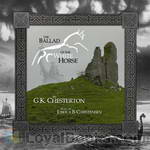 The Ballad of the White Horse
The Ballad of the White Horse
An English epic poem that follows the exploits of Alfred the Great in his defense of Christian civilization in England from the heathen nihilism of the North. Following a string of defeats at the hands of the invading Danes, a vision from heaven in the river island of Athelney fills Alfred with joy and hope. Though it gives no promise of victory in the coming struggle, it inspires him to rally his chieftains for a last stand against the invading hordes. His adventures lead throughout the country... | |
 Alarms and Discursions
Alarms and Discursions
Gilbert Keith Chesterton was an influential English writer of the early 20th century. His prolific and diverse output included journalism, philosophy, poetry, biography, Christian apologetics, fantasy, and detective fiction. Chesterton has been called the “prince of paradox.” He wrote in an off-hand, whimsical prose studded with startling formulations. Chesterton wrote about 4000 essays on various subjects, and “Ararms and Discursions is one of his collections. | |
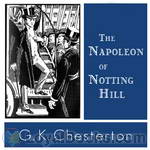 The Napoleon of Notting Hill
The Napoleon of Notting Hill
While the novel is humorous (one instance has the King sitting on top of an omnibus and speaking to it as to a horse: “Forward, my beauty, my Arab,” he said, patting the omnibus encouragingly, “fleetest of all thy bounding tribe”), it is also an adventure story: Chesterton is not afraid to let blood be drawn in his battles, fought with sword and halberd in the London streets, and Wayne thinks up a few ingenious strategies; and, finally, the novel is philosophical, considering the value of one man’s actions and the virtue of respect for one’s enemies. | |